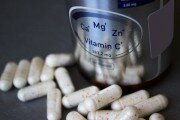Memory: Maintain your memory with folic acid
Folate (or folic acid) is a B complex vitamin, probably best well known to the general public as a nutrient taken by pregnant women to help prevent neural tube defects in unborn children. To a lesser extent, folate is known for reducing levels of homocysteine (an amino acid that promotes the buildup of plaque on blood vessel walls).
I would guess that folate is least well known for helping maintain cognitive performance. But that may change if Jane Durga has her way. Ms. Durga is a nutritionist at Wageningen University in the Netherlands. As part of her Ph.D. research on the effects of folic acid (synthetic folate) among the elderly, she lead a folic acid intervention study that offers promising results for those who want to help preserve their memory as they age.
Folic acid slows cognitive decline
The Durga study was presented in June 2005 at the Alzheimer’s Association International Conference on Prevention of Dementia. Ms. Durga and her team enlisted more than 800 men and postmenopausal women between the ages of 50 and 70 years. Subjects were randomly selected to receive either 800 micrograms (mcg) of folic acid per day or a placebo. The trial period lasted three years.
The results:
- In the folic acid group, blood tests revealed that average folate levels were five times higher than they were at baseline.
- Homocysteine levels dropped an average of 25 percent in this group.
- Subjects in the folic acid group performed significantly better than placebo subjects in cognitive tests that assessed memory, information processing speed, word fluency, cognitive flexibility and eye-hand coordination speed.
Ms. Durga told NutraIngredients-USA that this is the first study that convincingly demonstrates folic it’s effectiveness in slowing cognitive decline, even when the vitamin is not mixed with other B vitamins.
NutraIngredients-USA also reports that next winter the National Institutes of Health will release a new study that examines the effect of high doses of folic acid and other B vitamins on cognitive decline in Alzheimer’s patients.
The best dietary sources of this nutrient include spinach and other dark green vegetables, brewer’s yeast, lima beans, cantaloupe, watermelon, wheat germ, and liver from organically raised animals.
Even though this vitamin is easy to incorporate in the diet, alternative medicine pioneer, Dr Jonathan V. Wright, says that folate is quite high on the vitamin deficiency list. And those who have this deficiency are flirting with nutritional disaster. Dr. Wright wrote, ‘Folic acid (along with vitamin B12 and zinc) is absolutely key to DNA reproduction and repair.’
Supplements of folate are available as natural (folate) or synthetic (folic acid). The daily recommended intake of folate is 400 mcg. A high intake of folate can mask a vitamin B-12 deficiency in older people, so the US Food and Drug Administration has mandated that folate supplements can be sold in doses no greater than 800 mcg. But a B-12 deficiency can be easily avoided by eating plenty of meat, fish and eggs, or by taking B-12 supplements.
World renowned alternative health specialist Dr Allan Spreen, recommends supplements of 1.6 mg (1600 mcg) per day, and as much as 5 mg for those who want to address cardiovascular problems. Dr. Spreen points out that, ‘Folate isn’t effective in low doses except in a limited percentage of cases.’ And to avoid a deficiency of B-12, he recommends 1mg (1000 mcg) per day in sublingual form (dissolved under the tongue).
In addition, Dr. Spreen also suggests that to get the most out of this nutrient, 100 mg per day of B-6 is also necessary, as well as 400-500 mg of magnesium per day (to make the B-6 more effective). If you take a good quality multivitamin, you’re probably already getting a good foundation of these nutrients. But when addressing specific health concerns, Dr. Spreen recommends that you beef up the B vitamins and folate to reach these totals.
It is always a good idea to consult your health care professional before starting a new supplement regimen.
Did you find this information useful?
Then why not get more expert health recommendations just like this delivered direct to your inbox?
"It is truly refreshing to read a newsletter on the topic of alternative medicine which is scientifically based and reviewed by professionals..." - Robert Sinott
We respect your privacy and will never share your details with anyone else.Bear in mind all the material in this email alert is provided for information purposes only. We are not addressing anyone?s personal situation. Please consult with your own physician before acting on any recommendations contained herein.










